Portfolio Failures To Avoid
Harsh profile examples: 10 failures to avoid
Writing your own vita is always a challenge. Even if you have browsed plenty of bio advice, there is still a chance that you are making one of the profile errors that cost you interviews. And, to avoid making these failures, it helps to know how terrible portfolios look like.
Our team has come across some really harsh vita examples. The worst profiles feature poor formatting, unprofessional fonts, cliches, irrelevant work history, and spelling and grammar errors. If your bio has any of these issues, correct them to avoid missing professional opportunities.
In this article, you will find:
- four examples of terrible profiles that show exactly what NOT to do
- 10 biggest failures to fix in your bio, and
- expert tips to create a standout document.
Need an effective profile that will help you stand out? Try our affordable bio writing services. We will match you with a dedicated writer who knows your industry. The writer will transform your career story into a compelling narrative that emphasizes your strengths and speaks to the needs of the hiring managers. Chat with us to discuss how we can help!
Awful bio example #1: Formatting issues
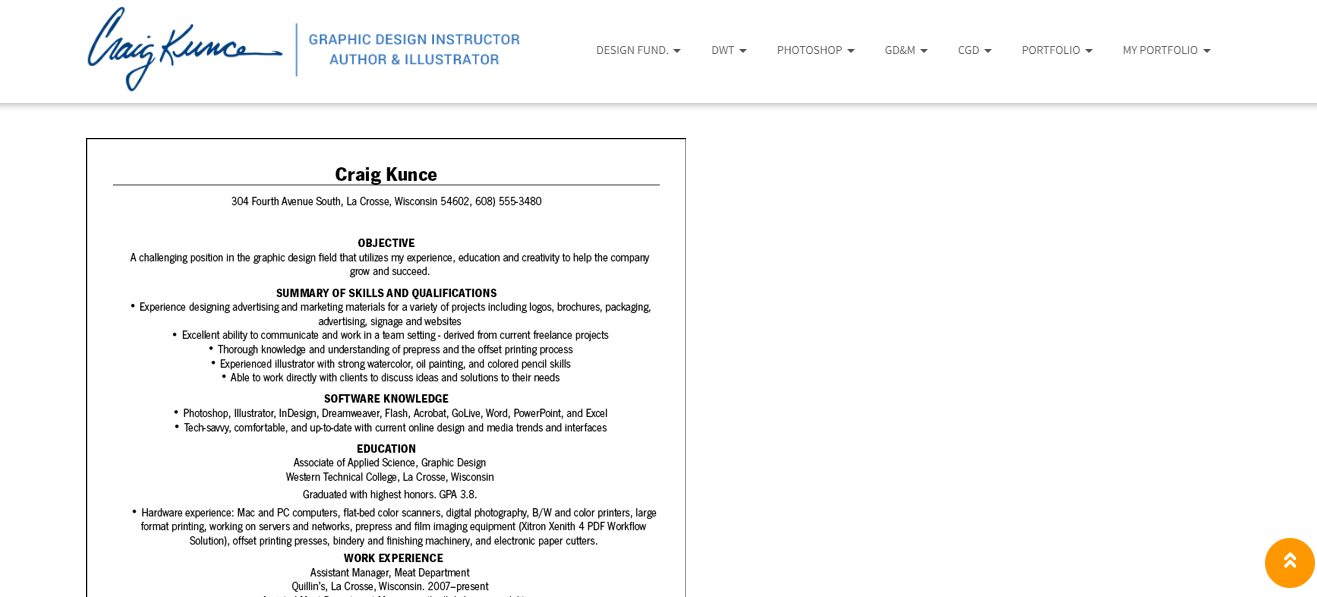
This document has all the needed sections and details about the candidate's education, experience, and achievements. Yet, poor formatting ruins everything. Text aligned to the center is very difficult to read. Plus, the section headings use the same font that the sections do. Thus, it is difficult to tell where one section ends and the other begins. Formatting is one of the common problems in terrible resume examples.
The solution? Align the text to the left and use a different font for headings. Removing the objective that doesn't contribute much will also go a long way.
Harsh bio example #2: The king of buzzwords
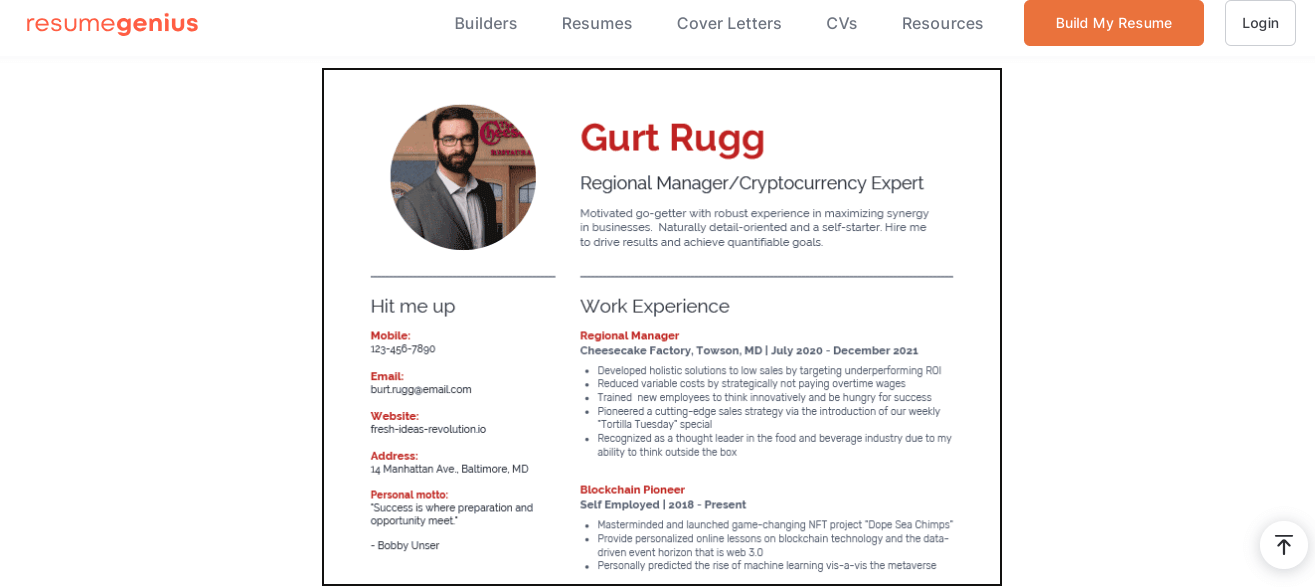
At first glance, it appears to be a good document. But once you give it a closer look, you'll see that the summary section is full of cliches like go-getter, self-starter, and maximizing synergy. Not a single word about what the candidate achieved in their career, how many years of experience they have, or what exactly they specialize in. The fancy design can be a problem, too. Such formatting can not open correctly with applicant tracking systems, and the human hiring manager will not be able to read it.
The solution? Use a clean, neat profile design with no photos, columns, or graphic elements. Instead of buzzwords and loud claims, include real achievements and experiences in the summary. The Work Experience section lacks tangible results as well. It would help to include some.
Disastrous bio example #3: Surprising work experience
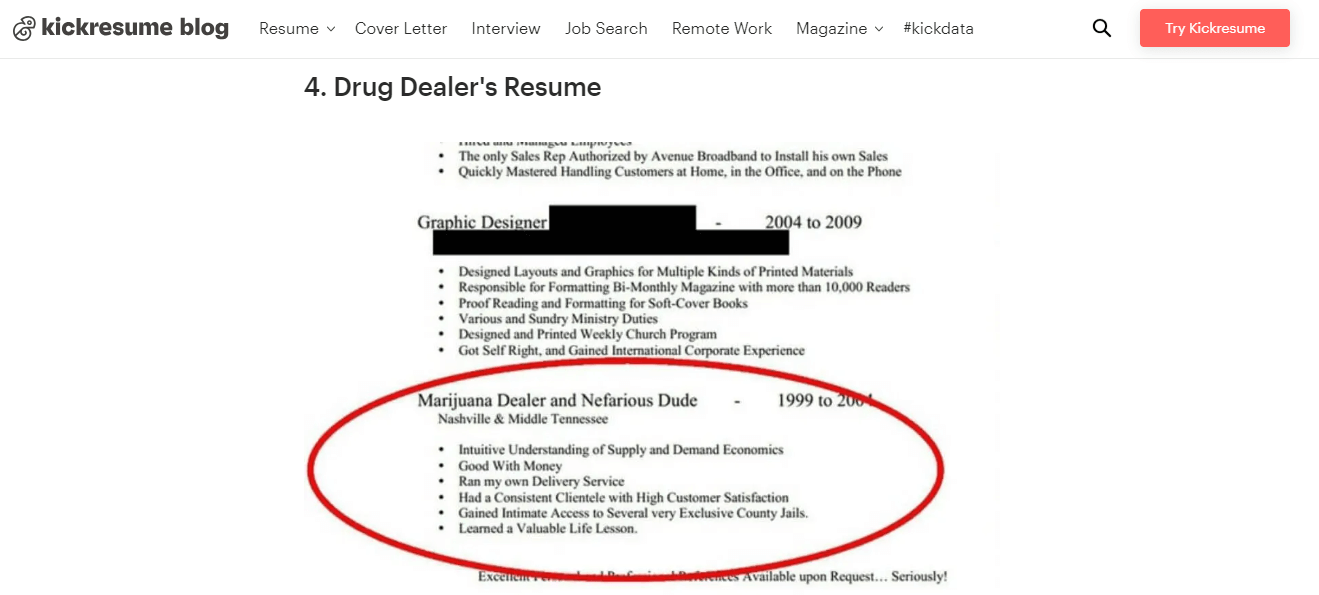
This example of a harsh portfolio depicts the duties of a drug dealer accurately (as well as the consequences of such life choices). However, it is both illegal and irrelevant to his further career as a graphic designer. Irrelevant positions get your document less focused, when the hiring manager guesses what position you're really after. At this point, it is a terrible vita that isn't likely to land interviews.
The solution? Remove irrelevant roles from your file, as well as questionable activity. If removing that irrelevant position leaves a huge gap, you can keep it. But be sure to list skills and achievements related to your target career.
Terrible profile example #4: The font enthusiast
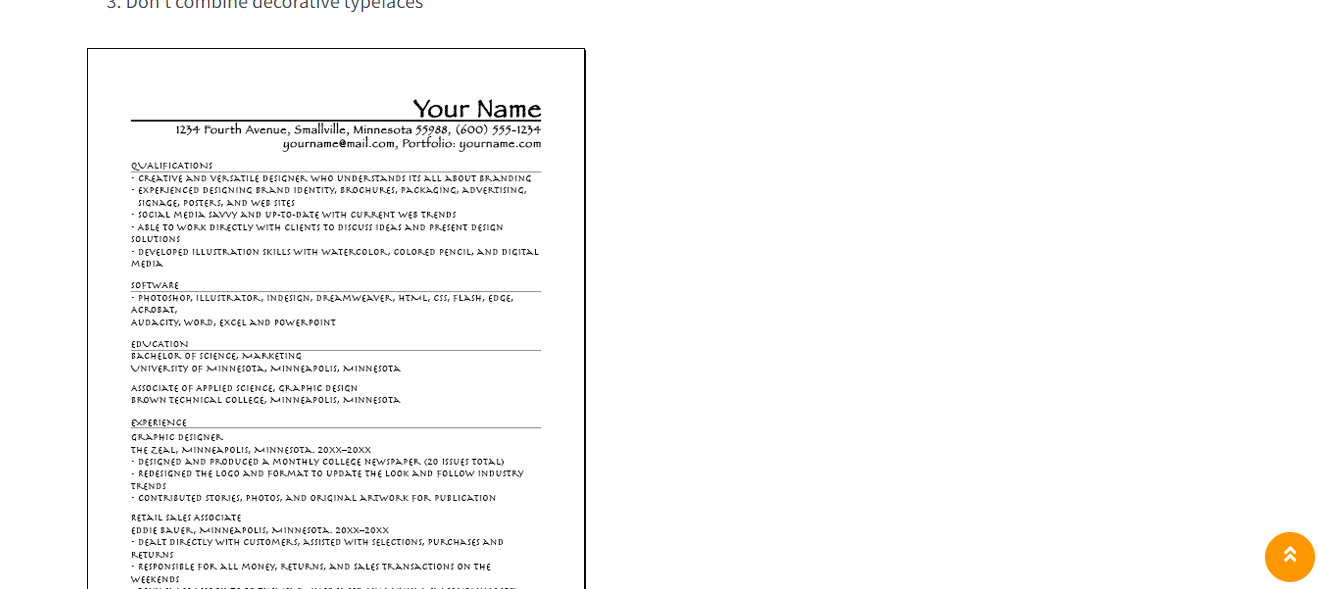
The biggest problem with this document is formatting. Papyrus, Comic Sans, and likewise are the worst fonts. They cuase the document look unprofessional, plus might not open correctly on the hiring manager's computer. Next, the font is the same everywhere - position titles, degrees, and even section headings are not capitalized or highlighted in any other way. This causes the document look clumsy and cluttered.
The solution? Using an unprofessional font and design is one of the most common errors. But they're easy to fix. Change the font to Arial, Calibri, or Helvetica and boldface the company names and role titles. Focusing the Qualifications section on a specific position will also help improve this portfolio.
Now that you know how your CV shouldn't look, let's review popular faults closely.
10 CV faults that will turn off the hiring manager
Many applicants turn to do the same failures that prevent them from getting interviews for their dream profession. Here are the common issues to fix in your profile right now:
Weak role descriptions
To succeed in today's competitive employment market, you need to speak through accomplishments and results. Hiring managers look for them in the first place. A list of your daily duties will turn off the recruiter or cause them to assume that you had poor performance.
Here's an example of an awful position description:
XYZ Company, March 2021 - June 2023
Customer service representative
- Answered phones.
- Processed requests from clients.
- Helped customers choose products and gave advice.
In this example, the applicant says nothing about what they achieved in this position. How many customers did they assist? Did they increase sales or customer satisfaction? What other functions did they have apart from customer interaction?
Be specific in your role descriptions, add figures and percentages, and add context to your duties. This step alone will help you stand out.
Multi-page resume
Let's face it: your resume is not an autobiography. Including position descriptions that take half of the page or listing all jobs and projects you had since 1995 will extend your resume than necessary.
According to hiring managers, the optimal resume length is up to 2 pages. If you have a multi-page resume, consider removing jobs you had over 10 years ago, irrelevant projects and hobbies, and community activities. Look through your education and list of skills and maybe cut off some outdated details as well.
Remember to list your jobs in reverse chronological order. If you start with your oldest job, the employer might assume that this was your last employment, and will not look further.
Many short-term jobs
Today, hiring managers are not as suspicious about job-hopping as they were 15 years ago. Still, having a sequence of jobs each of which lasts a few months does raise concerns. The employer might wonder: are your professional qualifications not enough and did you underperform? Did you fail to get along well with others? Do you have commitment issues?
All of these questions can prevent you from getting interviews. Here are the possible solutions:
- If the job position only lasted 1-3 months, consider removing it. A short gap between jobs is better than a suspiciously short-term employment.
- If you have a few short-term jobs, explain why you left so early. If the company went through mergers and acquisitions or there were massive layoffs, you can specify that as a reason. Thus, the employer will see that resignation has nothing to do with your performance.
- If you left jobs because of personal reasons or a toxic environment, keep the most relevant ones and remove the rest.
Employment gaps
All bad resume examples above don't feature employment gaps. However, they are still seen as a negative thing. Employers can think that you lose your skills and competencies during unemployment, or that you struggled to land jobs in the past.
It is hardly possible to hide gaps in employment (some experts recommend indicating years of employment only, but that can be tricky). Your goal is not to let these gaps make a poor impression during your job search. For that, all gaps need explanation.
If you were unemployed from 2021 to 2023, explain what you were busy with. Chances are that you volunteered, did community work, took workshops or professional training, or else. Make sure that your resume or cover letter reflects it.
If you took care of your children, consider adding babysitting as your full-time job. Here's how it can look like:
Stay at Home Parent May 2021 - Present
- Engaged children with games and activities and promoted good behavior
- Helped elementary students with coursework, improving their academic results
- Successfully organized elementary school events and fundraisers
Irrelevant information
Your resume is a marketing document for a specific position. Thus, it needs to be focused on qualifications and achievements that make you a fit for this position. If your work history features jobs in accounting, customer service, and as a yoga instructor, employers might wonder what you are really interested in.
Say, you have the position of an accountant in mind. For that, you need to keep jobs related to accounting and finance only. If you have little relevant experience, keep customer service jobs, too. Go through your Skills section and remove generic skills such as time management, organization, teamwork, and adaptability. Keep the hard skills related to accounting software, principles, and regulations. Such a focused document will help you go further in the hiring process.
Spelling and grammar mistakes
Sometimes, the main difference between a good vs bad resume is typos and poor grammar. According to the stats, 59% of recruiters reject resumes with misspelled words and grammar mistakes. The logic is simple. If the candidate doesn't bother to proofread their own resume, they will hardly be motivated to deliver good results in the workplace.
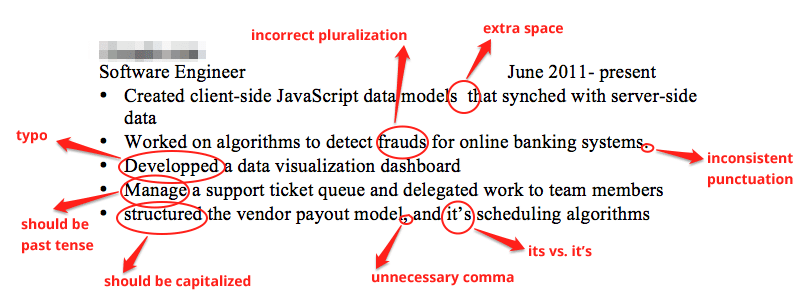
Here's what resume mistakes really tell the recruiter.
So, where do you start? First, run your resume through the online spell checker to spot the most common resume mistakes and grammar errors. Tools like Grammarly and GrammarCheck will help you review and approve the corrections. Next, read your resume line by line and consult a dictionary if not sure. Have a trusted friend or coworker proofread your resume. Chances are, they will spot mistakes you have overlooked.
Want to take your resume to the next level? Use our Resume Editing service. At a very affordable fee, our expert will correct your resume content, improve formatting, and strengthen your writing style. We will fix all potential "red flags", ensuring that your resume makes the right impression on recruiters. Try today!
Unprofessional formatting
At ResumePerk, we have seen many bad resume examples with poor formatting. A resume with three different fonts including Comic Sans. A resume with bullet points in one job and paragraphs in the next one below. Resumes with uneven bulleted lists, hard-to-read fonts, and crazy colors like they were drawn by a 5-year-old. Such resumes will give a recruiter a good laugh, but won't help you secure an interview.
|
Bad resume fonts |
Good resume fonts |
|
|
Here are some quick strategies to fix formatting:
- Use a popular resume font (as suggested above), 10-12 pts.
- Use a different font for your name and section headings for readability
- Left-align the resume text
- Write in bullet points, not paragraphs
- Remove any images, distracting graphics, tables, charts and else as they might be ATS-unfriendly.
No keywords
Nearly 99% of Fortune 500 companies use applicant tracking systems (ATS) to screen candidates. You might not have a bad resume, but if it doesn't have the needed keywords, it might get tossed before the hiring manager sees it.
Review the job posting and underline the skills names, qualifications, and requirements that appear frequently. Include them naturally when describing your skills and experience. Use the same words and phrases that the employer does in the job listing.
Be careful with resume templates - many of them have complex formatting which ATS fails to read properly. Thus, your resume will get tossed even if you are qualified.
In 2024, tailoring your resume for a target job and including keywords are the must-haves. It is time-consuming, yet a non-optimized resume will not land you an interview.
Graphics and pictures
Many job-seekers add graphics, images, charts, and fancy formatting to draw the attention of hiring managers. However, the effect might be just the opposite. If you don't have graphic design skills, your resume might end up looking unprofessional and turn off employers. Plus, graphic elements are usually ATS-unfriendly. The system will either toss your resume or distort the content, making it unreadable for a human hiring manager.
The best bet is to use clean, neat, plain formatting. Restrain yourself from using columns, graphics, charts, or else. Want to show off a beautifully designed resume? Publish it on your personal website or add it to your LinkedIn profile. But when it comes to job applications, use a plain text resume in MS Word or PDF.
The overuse of buzzwords
Resumes with cliches make a poor impression on today's recruiters. A good resume in 2024 must be specific and boast the results of your work. If your summary section sounds like this:
Proactive go-getter who works well in a team and has great customer service skills.
Then, your resume needs a serious update.
Remove the buzzwords and replace them with facts. Think about where and how you demonstrated your hard and soft skills in the workplace. Give specific examples. Here is how you can do it:
Team player: Participated in weekly team meetings to share best practices, leading to a 30% increase in customer satisfaction.
Attention to detail: Conducted audits of financial transactions, identifying discrepancies to achieve 100% accuracy in financial records.
By fixing these issues in your document, you can transform a bad resume into a competitive one. First impressions matter, so it is important to convey your value as a professional proactively. As you correct resume mistakes, you'll focus more on what you can contribute and increase your employability.
Need help with preparing a winning resume?
At ResumePerk, we create competitive resumes for 70+ industries. Our experts can enhance your current resume, fixing major shortcomings and spelling mistakes. Or, we can create a brand-new resume for your target job.
Unlike most resume services, we use a focused approach. We match you with an expert and they work on your resume until you are satisfied with it. Make the first step towards your dream career - order a pro resume!
Recommended reading:
- Common Mistakes On Student Resumes
- How To Fix My Resume? 3 Surefire Ways
- Top 15 Resume Mistakes to Avoid in 2020
Author: Editorial Team at ResumePerk.com
Reviewed by: Certified Career Expert
Last updated: December 2025


